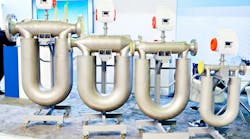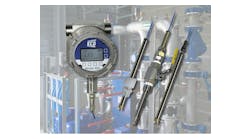GE Water & Process Technologies (www.gewater.com) provided an antiscalant technology program, GE Betz HT15/PDC9323, to Water en Energiebedrijf (WEB) Aruba N.V., which provides power and water to the island of Aruba. The system is based on a scale inhibitor for use in multi-stage flash (MSF) plant evaporators using steam to drive the desalination process to obtain potable water.
The technology was used in WEB Aruba’s Aquachem 5 (AC-5) MSF plant which has 40 stages — 36 recovery and four reject — enclosed in seven vessels and a capacity of 600m3 per day. Prior to using the GE program, sulfuric acid was injected into the makeup line prior to the dearator. GE’s antiscalant technology was added in two places: downstream of the brine recirculation pumps and at the entrance to the warmest stages.
The antiscalant program at WEB Aruba’s AC-5 MSF plant was monitored for a six-month period. Results of the program were a success, according to GE, meeting all of WEB Aruba’s goals. The system effectively controlled scale at a TBT of 110 degrees Celsius, without acid addition at a concentration factor of 1.5 cycles. In addition, the plant’s gained output ratio was maintained, and the new technology had little or no adverse effect on plant corrosion. Brine heaters were clean after the six-month period, according to GE.
MSF plants use thermal technologies in the desalination process. To increase heat transfer efficiency, steam is used to heat the influent seawater and sequential chambers. While most substances are easily dissolved in higher temperatures, calcium and magnesium salts naturally contained in seawater exhibit retrograde solubility. As brine temperatures increase, the solubility of the mineral compounds decrease. The resulting scale accumulates on heated surfaces and disrupts heat transfer. Scale control in high-temperature desalination processes is primarily achieved by acid dosing, or with addition of antiscalant chemicals and ball cleaners.

